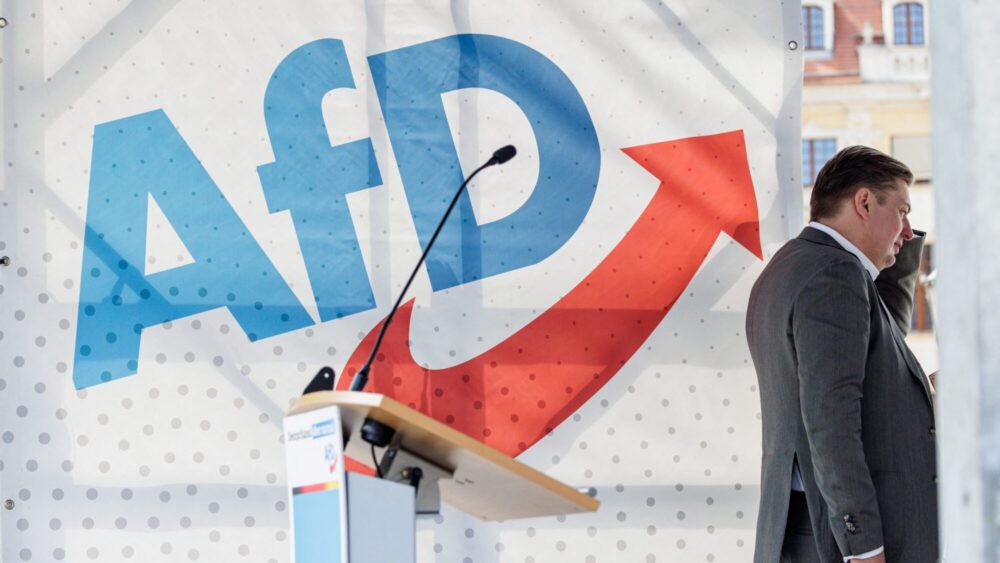
Maximilian Krah
JENS SCHLUETER / AFP
More member parties of Brussels’ right-wing populists block have distanced themselves from the German Alternative für Deutschland (AfD), demanding either its lead candidate, MEP Maximilian Krah, be kicked out or the party itself leave the Identity and Democracy (ID) group following Krah’s statements perceived as relativizing Nazi war crimes.
Following the French Rassemblement National, the Italian Lega party, and the Danish People’s Party also distanced themselves from Krah and AfD.
As a result, AfD’s federal leadership decided on Wednesday (May 22nd) morning, that Krah must leave the party’s presidential board, effective immediately, as well as to bar him from having any public appearance “by whatever communication channel,” a senior AfD official confirmed to The European Conservative.
Minutes after the meeting ended, Krah tweeted his own slightly more positive version. He began by saying that he was anticipating that his “factual and nuanced” statements about the Waffen-SS would be used against him, but, he added, the last thing AfD needs right now in the final stage of the EU election campaign is a controversy around the lead candidate. Therefore, he is resigning from the party’s executive board and foregoing any further campaign appearances.
Man kann nie tiefer fallen als in Gottes Hand. Ich nehme zur Kenntnis, dass sachliche und differenzierte Aussagen von mir als Vorwand missbraucht werden, um unserer Partei zu schaden. Das Letzte, was wir derzeit brauchen, ist eine Debatte um mich. Die AfD muss ihre Einigkeit…
— Dr. Maximilian Krah MdEP (@KrahMax) May 22, 2024
AfD’s regional delegations are also meeting later on Wednesday to weigh in on the issue, but the saga is far from over.
ID’s internal crisis began on Tuesday, May 21st when Marine Le Pen’s Rassemblement National (RN) announced it would not sit with AfD in the next mandate after Krah, the German party’s lead candidate, appeared to relativize the crimes committed by the Waffen-SS, the Nazi regimes’ infamous elite commando.
Specifically, Krah said that not every SS soldier can be automatically declared a criminal, citing examples like Günter Grass, a Nobel Prize-laureate member of the organization. “Among the 900,000 SS, there were also many peasants: there was certainly a high percentage of criminals, but not only that,” Krah said in an interview published on Saturday.
The fallout between ID’s two largest parties is further complicated by the follow-up announcement from Matteo Salvini’s Lega, the group’s third-largest member party, saying that it and RN are “perfectly aligned in agreement” that there’s no future for AfD in the ID group.
The Danish People’s Party’s MEP Anders Vistisen, ID’s unofficial Spitzenkandidat also came out against Krah in a tweet, demanding AfD get rid of him if it wants to remain part of the ID.
Clearly, the AfD leadership is trying to control the fallout as much as possible by distancing itself from Krah, even if some of them believe that Rassemblement National intentionally blew the scandal out of proportion for political reasons and not just because of what the German MEP said.
“The problem is that the older managers of the RN today very well remember the ‘détails de l’histoire’ of Jean-Marie Le Pen when speaking of the past, 1933-1945,” AfD’s senior Brussels official told The European Conservative, hinting at the former RN leader and Marine Le Pen’s father’s similarly scandalous remarks, said have been relativizing the Holocaust.
“If they hear today by Maximilian Krah that the officers of the Waffen SS were not all criminals but each possible offense must be attributed individually case by case, Krah is not entirely wrong,” the official continued. “But the immediate perception is that he relativizes the SS which sounds like a ‘detail de l’histoire.’”
Nonetheless, Krah is the figurehead of an undoubtedly more radical and increasingly bothersome faction within the AfD, which the rest of the party has been trying to neuter for some time to save its reputation.
“Krah was installed by the Höcke-Flügel against all the wishes of many others, but Höcke threatened to take over the party,” the official explained. “Now Krah is doing Höcke-Flügel politics.”
Björn Höcke is AfD’s regional leader in Thuringia, and just as much a controversial figure as Krah, if not more. He was regularly accused of making antisemitic statements, and in 2015 he was outed as the author of several articles published in a Neo-Nazi magazine under the pseudonym “Landolf Ladig.” Höcke denied authorship but refused to sign an affidavit distancing himself from the neo-Nazis as demanded by the AfD’s federal executive board.
The same year, Höcke established the Flügel (Wing), a ‘far-right’ faction inside AfD, which was classified as an extremist organization and outlawed by the German domestic intelligence agency BfV in 2020. At the time of its de jure dissolution, BfV estimated that up to 20% of AfD members belonged to the faction.
So, while the remaining Flügel faction has never been popular among the majority of the party members and represents an internal threat, its influence still lingers. That’s why AfD was probably unable to get rid of Krah a year ago when The European Conservative first broke the story about the MEP’s suspected Chinese spy assistant or in the past months after the German authorities confirmed the initial allegations.
Belonging to Flügel might also be the reason why Krah doesn’t seem to care about optics at all. As another AfD source told us, he was never really interested in keeping the AfD inside the ID, but instead would like to take over the whole party and turn it into the core of a new European Parliamentary bloc even further to the right.
